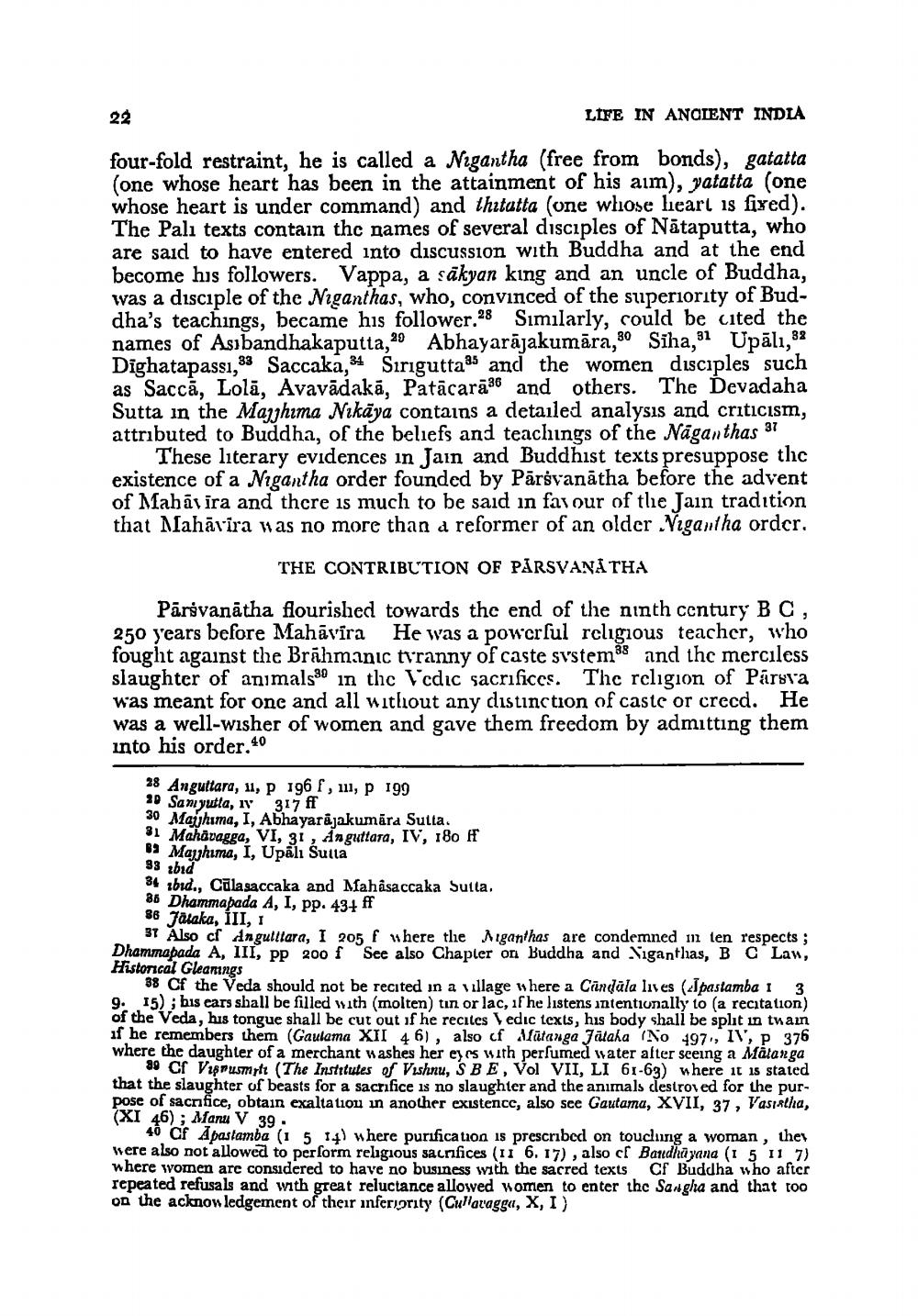________________
22
LIFE IN ANCIENT INDIA
four-fold restraint, he is called a Nigantha (free from bonds), gatatta (one whose heart has been in the attainment of his aim), yatatta (one whose heart is under command) and thtatta (one whose lieart is fixed). The Palı texts contain the names of several disciples of Nätaputta, who are said to have entered into discussion with Buddha and at the end become his followers. Vappa, a sākyan king and an uncle of Buddha, was a disciple of the Niganthas, who, convinced of the superiority of Buddha's teachings, became his follower.28 Similarly, could be cited the names of Asibandhakaputta, 29 Abhayarājakumāra,30 Siha,31 Upālı,32 Dighatapassi, 33 Saccaka, 34 Siriguttaa and the women disciples such as Saccă, Lolā, Avavādakā, Patācara and others. The Devadaha Sutta in the Mahima Nikāya contains a detailed analysis and criticism, attributed to Buddha, of the beliefs and teachings of the Naganthas 37
These literary evidences in Jain and Buddhist texts presuppose the existence of a Nigantha order founded by Pārsvanātha before the advent of Mahavira and there is much to be said in favour of the Jain tradition that Mahāvīra was no more than a reformer of an older Vigantha order.
THE CONTRIBUTION OF PĀRSVANATHA
Pārsvanātha flourished towards the end of the ninth century BC, 250 years before Mahāvīra He was a powerful religious teacher, who fought against the Brāhmanic tyranny of caste systems and the merciless slaughter of animals in thc Vcdic sacrifices. The religion of Pārsva was meant for one and all without any distinction of caste or crecd. He was a well-wisher of women and gave them freedom by admitting them into his order. 40
38 Anguttara, 11, P 196 f, 111, p 199 2D San yutta, vy 317 ff 30 Mayhima, I, Abhayarajakumāra Sutta. 31 Mahavagga, VI, 31 , Anguttara, IV, 180 ff * Mauhma, I, Upāli Sutta 93 zbid 84 bd., Calasaccaka and Mahasaccaka Sutta. 86 Dhammapada A, I, pp. 43+ ff 36 Jalaka, III,
31 Also cf dagulllara, I 205 f where the Arganthas are condemned i ten respects; Dhammapada A, III, pp 200 f See also Chapter on Buddha and Siganthas, B C Law, Historical Gleanings
38 Cf the Veda should not be recited in a village where a Candāla lives (Lipastamba 1 3 9. 15); bis ears shall be filled with (molten) tin or lac, if he listens intentionally to (a recitation) of the Veda, his tongue shall be cut out if he recites Vedic texts, his body shall be split in twain if he remembers them (Gaulama XII 46), also cf Alūtanga Jataha (No 497., IV, P 376 where the daughter of a merchant washes her eyes with persumed water after seeing a Mälarga
89 Cf Virusmyft (The Institutes of Vishnu, SBE, Vol VII, LI 61-63) where it is stated that the slaughter of beasts for a sacrifice is no slaughter and the animals destroyed for the purpose of sacnfice, obtain exaltation in another existence, also see Gautama, XVII, 37, Vasiatha, XI 46); Manu V 39.
40 Cf Apastamba (1 5 14) where purification is prescribed on touching a woman, they were also not allowed to perform religious sacrifices (11 6. 17), also cf Bandha yana (1 5 11 7) where women are considered to have no business with the sacred texts Cf Buddha who after repeated refusals and with great reluctance allowed women to enter the Sangha and that too on the acknowledgement of their inferigrity (Curlavagga, X, I)




